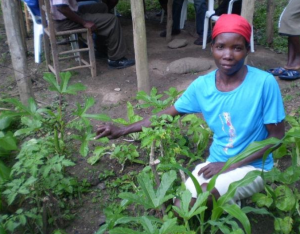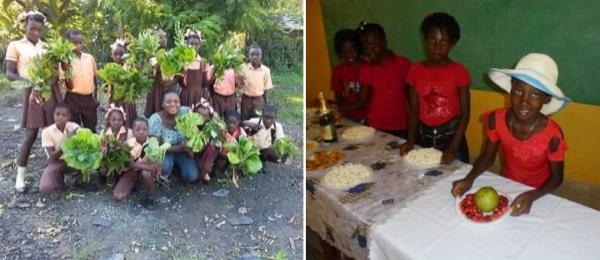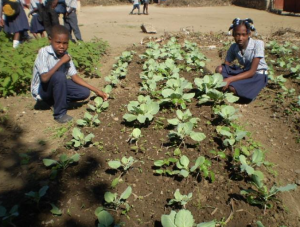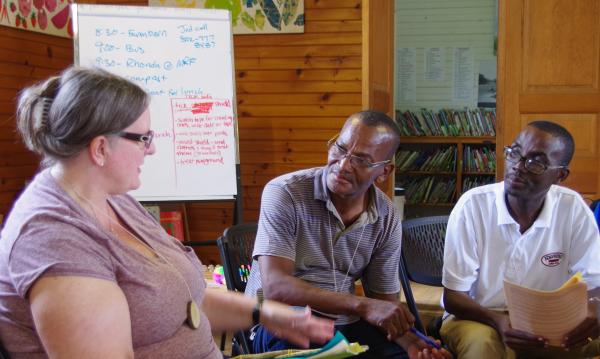Hello Vera,
While all this choking situation happening at the Texas border, it gives me hope that a group of people is doing something sustainable with the Haitians in the north of the country.
I’m from Haiti , I’m an educator . I live in Vermont and I still hope to return to Haiti before i be toi old! Working in agriculture is one of my project there.
Thank you and continue your good work .
Regards
Elsie
Perseverance and Hope in Haiti During Times of Upheaval
As Shelburne Farms works towards a vision of a healthy and just world rooted in stewardship and community, partnerships with organizations like Ayiti Konsè Vèt (Keep Haiti Green) are helping us all get there. These initiatives are less visible than our campus programs for students or teachers that you may see when you visit, but through them, we expand our understanding of sustainability globally, and we lean on one another for inspiration and when things get tough. Due to the recent earthquake and natural disasters in Haiti, we are highlighting the work of Ayiti Konsè Vèt now.
Step into a school garden in northeastern Haiti, and you’re greeted with beauty. “This is where nature talks to me,” Wedly Pierre Decéus, agronomist with Ayiti Konsè Vèt (Keep Haiti Green) says. “Sow a seed today, it [becomes] a little plant, and a couple of [weeks] after it gives fruit or vegetables to eat.”
Shelburne Farms first met the Pierre Decéus brothers and their colleagues in 2006 during a sustainable agriculture study tour through Vermont. We quickly found alignment with their commitment to sustainability and understanding the power of farm to school work.
“During my first visit to Vermont, my life, my ideas, and my perception changed,” Wedly Pierre Decéus reflects. As a young agronomist, he had applied his theoretical knowledge to farming, but his work evolved as he visited farms practicing sustainable agriculture. “[From then on,] I prioritized sustainability in everything.”
Assisting students to understand and act to change “social ills” within their communities is a fundamental component of Shelburne Farms’ Education for Sustainability work. In the summer of 2016, AKV’s coordinating staff furthered their work in Education for Sustainability with another study tour to Vermont, and in 2019 they attended, Project Seasons for Young Learners at Shelburne Farms. Here, they explored the Big Ideas of Sustainability with peers from around the world, while sharing how their programs are building a more sustainable Haiti.
Wedly Pierre Decéus shares one such story."A boy whose father was teacher at the school garden, he takes some plant of cabbages in the nursery, transplant them at home, take care of them. Three months later, the cabbages was ready to be harvested. He harvested them and ask [his] mother to sell them in the local market. With this money, he purchased a chicken, and she produced eggs. The eggs hatched and gave little chicks. He sold the chicks fews months later to purchase a female goat. This is one of our success story."
At its height, AKV developed and successfully managed programs in five areas: school gardens, home gardens, adult literacy classes, school garden internships for fourth and fifth-year university agronomy students, and livestock breeding of poultry, sheep, goats, and rabbits. However, like the water, nutrient, and insect life cycles that their students study, AKV has followed a cycle of growth, decline, and now revitalization. Today, facing a funding deficit, severe natural disasters, disease, and poverty, AKV staff find themselves working in conditions they describe as “almost inhuman”. They have temporarily suspended all programs with the exception of seven school gardens and adult literacy classes. Nonetheless, they are dedicated to rebuilding through “insistence, perseverance, and determination,” Wedly Pierre Decéus says.
During this turbulent time, we invite you—our farm community—to support AKV. If you’re able, please contribute in support of their work, and follow along as we share updates from the Pierre Decéus brothers and their perseverent efforts to build a sustainable Haiti.
Financial gifts between now and December 31, 2021 will be used to:
- Purchase garden tools, books, and other supplies for the school gardens currently in operation;
- Replace small livestock (sheep, goats, rabbits, poultry) lost to natural disasters;
- Cover start-up costs so the school gardens which have been temporarily closed can reopen;
- Fund transportation costs for university agronomy students to travel to school garden sites for internships;
- Print learning materials for literacy classes and support monitor (instructor) salaries;
- Support AKV staff salaries to cover essential living expenses like clean water;
Donations are processed and acknowledged by Shelburne Farms, the fiscal agent and US Community Partner of Ayiti KonsèVèt. Shelburne Farms is a 501(c)(3) nonprofit organization.
Donate
AKV would like to thank Paddy Wade and the Vanderbilt Family Foundation for their many years of program sponsorship support, along with other partners and donors including: Fred Bay and the Bay and Paul Foundations, Matthew and Mary Kelly and the Kelly Family Foundation, Proliteracy Worldwide, SEED Program International, and the Vermont Institute on the Caribbean (now Caribbean Acroecology Institute).
Comments
I, too, am delighted that Shelburne Farms has made the commitment to share its resources with AKV. It is a commitment not only to sustainable agriculture but also to repairing the injustices of our country's relationship with Haiti since 1802. I went to Haiti in 2010 under the auspices of AKV. I visited most of the school gardens, met with teachers and students, taught English and music, and left after six months with a strong sense that I had been given more than I gave. Insecurity and financial hardship were ever-present realities for all my hosts. I have come to feel that what Haitians most appreciated about my visit was simply that they were seen, and that I was now a witness. June, the Deceus brothers, and their associates have managed AKV in a way that fulfills both the environmental and political implications of the word 'sustainable'.
As someone who works in fundraising and development at a small nonprofit New England farm, I am heartened and emboldened to see Shelburne Farms promote this commitment and encourage its membership to donate. It can feel risky for nonprofits that rely on individual donations to do so, as it invites comparative need assessments when people open their checkbooks. Kudos for recognizing that we live amongst tremendous affluence that we accept as everyday, and that sharing expands our farm family across national borders.




